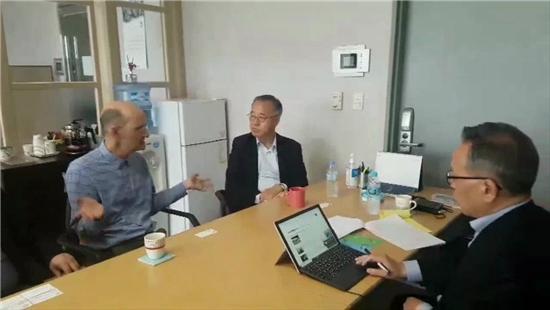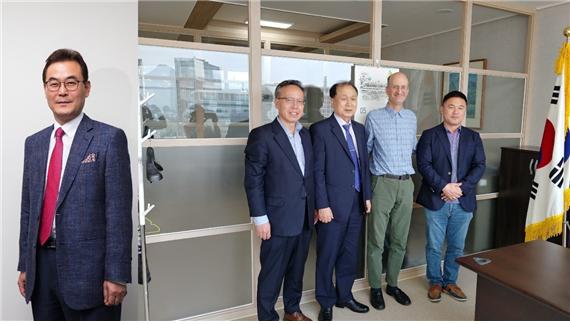
Hong Jin-ki, Chairman of the National Forum Cooperation Committee, attended a seminar with U.S. presidential candidate Emanuel Pastreich with me. Chairman immediately asked the standard question,
“As President, would you recognize North Korea's nuclear program and what steps will you take to assure denuclearization?”
Candidate Pastreich’s response was direct and entirely logical, although perhaps a bit off the beaten path for American politics.
“The United States has a long tradition of encouraging scientific thinking. North Korea's nuclear programs should be scientifically verified through material evidence and the reports presented by North Korea itself, and third parties. If the evidence suggests there is a successful nuclear program, which it does, then we have an obligation to acknowledge it. At the same time, we must recognize that nuclear weapons are outdated “dirty” weapons that have been superseded by other advanced systems and have little strategic value. They should be eliminated altogether, starting with the United States and Russia.”

Pastreich’s response reflects his unconventional approach to politics, combining rational engagement with a transformative vision for the American role in the world.
Pastreich established himself as an academic, expanding his original work in Asian comparative culture into a dialog with politicians, NGOs and security experts on creative and non-confrontational approaches to solving the complex international problems of the current age.
I asked Pastreich about the submission by the Trump administration of United States Strategic Approach to The People's Republic of China” to Congress on May 21. The report advocates that the U.S. push for the modernization of its strategic nuclear triad while taking strong countermeasures against cyber-security threats from China which are increasing as a result of Chinese advances in telecommunications technologies and intelligence capacity.
This report represents a bipartisan fundamental shift in the US strategic posture towards China that focuses on a new era of competition, extending to supersonic missile systems, cyber weapons, and space-based weapons.
North Korea’s outdated nuclear weapons are no match for new American weapons, but the Chinese response is serious.
I told Pastreich that I thought Korea would have to choose between the U.S. and China as their struggle for hegemony heats up.
I also suggested that Europe and the U.S., which have been impacted the worst by COVID-19, may try to enlist South Korea and North Korea in a hegemonic struggle against China that could be risky. I mentioned that there are signs that Japan has similar ideas in mind.
I drew a parallel to the Japanese strategy of increasing its influence on the Korean Peninsula in the age of global imperialist competition as best represented by the Taft–Katsura secret agreement of 1905 in which the United States recognized Japanese expansion into Korea and Japan recognized American domination in the Philippines. I also suggested that we can see a similar mapping out of spheres of influence in the1950 description of a “defense perimeter” by US Secretary of State Dean Acheson that omitted the Korean Peninsula. Such a comment was interpreted by North Korea and the Soviet Union as a green light to extend their control through the entire Korean Peninsula.
Pastreichexplained that there is a cultural aspect to the conflicts then and now. He noted, "The ‘Yellow Peril’ of Asia was a major theme in domestic politics in the United States, and Europe, in the 19th and 20th centuries. The Yellow Peril was promoted in the media to encourage the fear that the West would be overrun by the Japanese, Chinese, and other “yellow” races. That development was a marked shift from the admiration for Chinese governance and culture in the 18th century.
“The Yellow Peril theory led to the prohibition of Chinese immigration to the United States and extreme limits on immigration from all of Asia. That decision shaped what sort of a nation America became. We can see hints that such a severe restriction of Asian immigration, and the impact of Asian culture, is being planned again. It may be aimed at China at first, be just as in the late 19th century, it will impact Korea and Japan as well.”
He suggests that South Korea should look for solutions to the conflicts between the U.S. and China and the tensions with North Korea as part of a comprehensive vision for the future of Asia as a whole, and avoid obsession with specific issues.
Pastreich explained,
“If Korea can establish a new wave of constructive internationalism in East Asia, and build initiatives for meaningful cooperation with local government and other NGOs throughout the region, that will make possible true dialog on long-term issues with the governments of the United States, Japan, China and Russia. Without such deep engagement, however, summit meetings are nothing more than publicity stunts.”
He noted that he has not seen any signs of a systematic plan in the mainstream of Japan or China, both countries he knows well, to dominate Korea. The challenge for South Korea, however, it to have the bravery and the determination to put forth its own vision for the region and to work with partners throughout the region, and in the United States, to realize it.
“Such a daring strategy,” Pastreich remarked, “is akin to that of the Korean Admiral Yi Sun-shin who defended Korea during the Japanese invasions of the 16th century. Admiral Yi wrote, ‘If you are just focused on surviving, you will surely be killed in the battle. But if you are totally willing to die in your fearless struggle, then a road to survival will emerge.’ This is an age that demands of us determination and bravery.”
Pastreich elaborated on Korea’s potential future role, stating that "Korea is a country with a long history and outstanding precedents for innovation in education and policy going back thousands of years. This is one of those fluid moments in history that could allow Korea to be a game-changer in the formation of a new international community in the post-COVID19 era.”
Pastreich asserted that his administration would actively support the unification of the Korean Peninsula and encourage Korean self-determination.
Pastreich expressed concern that the "Political paralysis in the U.S. under COVID-19 demands of politicians that they find some excuse or distraction. Politicians like Trump, or Democrats as well, are playing up conflict with China as part of such a domestic agenda and sadly American intellectuals are silent, even complicit, in this process.
The decision-making process in Washington D.C. these days is driven more by President Trump's self-righteousness than expert opinion or deliberation. Pastreich expressed confidence that Korea could make the best of its sophisticated organizational culture in such a power vacuum, putting forth a vision for the region, and for the world.
Pastreich drew attention to the challenges posed by the Fourth Industrial Revolution, noting that if countries see technological change only in terms of potential profit, the future of mankind will be gloomy. But Korea has managed to integrate human interactions with internet-based communications to a large degree, offering the potential for more positive use of technology.

Kim Dong-sung, CEO of GMTV, also joined the seminar, remarking that, "Pastreich is a candidate for president with a profound understanding of Korea and he has embraced a peaceful vision for Northeast Asia. We need to do what we can to support his election and bring the U.S. and South Korea together to take the lead in opening an era of human peace."
Pastreich did not accept my reference to the Roman strategy, "If we want peace, we have to prepare for war." Instead, he argued that humans have the ability to solve many problems through meaningful dialogue.
He insisted, however, that we need a thoroughly scientific analysis and a long-term strategic perspective that supports creative solutions" to deal with both immediate challenges and long-term development.
From my perspective, I consider Pastreich's arguments to represent a practical argument for peaceful engagement using realistic alternatives. His responses are carefully formulated and suggest a deep engagement in the policy process.
Korea plans a "Great Brushing" to overcome Corona 19 at which people around the world will draw pictures using the digital apps on their smartphones or other devices. This event brings citizens of the Earth together in a non-commercial and non-political cultural event that comes close to the World Cup and the Olympics in its scale. Pastreich serves as an advisor to "Great Brushing" and promises that he will work hard for the cause.
Emanuel Pastreich was born in Nashville, Tennessee, in 1964, and graduated from Lowell High School in San Francisco in 1983. He began his studies at Yale University, where he graduated with a B.A. in Chinese in 1987, studying also at National Taiwan University for one year. Pastreich obtained an M.A. in comparative literature from the University of Tokyo in 1991. He then returned to the United States where he received his Ph.D. in East Asian studies from Harvard University. He served as a professor at the University of Illinois at Urbana–Champaign, George Washington University, and Kyung Hee University. He founded the Asia Institute in 2007 which has offices in Washington D.C., Seoul, Tokyo and Hanoi.
Pastreich will officially announce his candidacy on the 20th floor of the Korea Press Center (20th floor) in Gwanghwamun from 2:30 p.m to 5:00 pm on June 15 as the first step towards the launch of his formal campaign (RSVP 010-9935-7730).
I wonder if perhaps, just as Barack Obama made use of his African-American heritage to be elected president in 2009, this current crisis could be an opportunity for a Korean-American to be elected to that office.
I look forward to the day when I can prepare for my first exclusive interview with the first Korean-American President Emanuel Patreich at the White House in January 2021.


